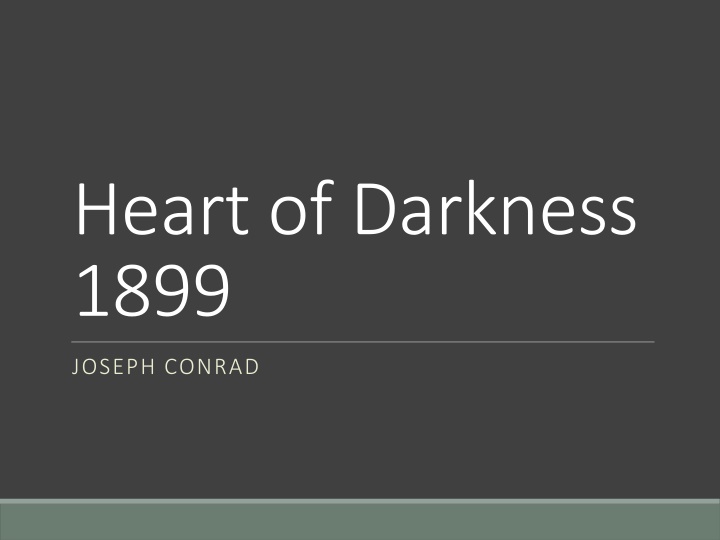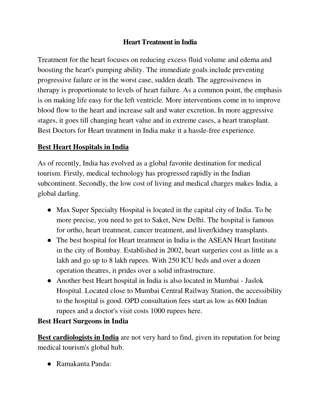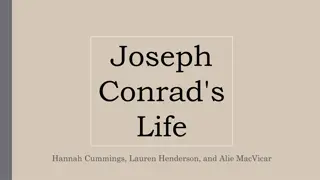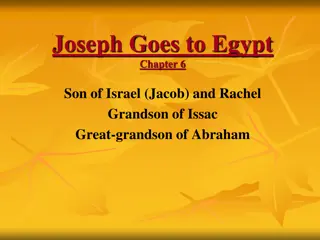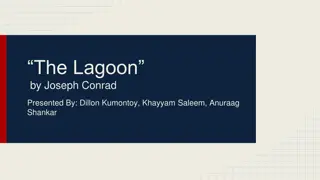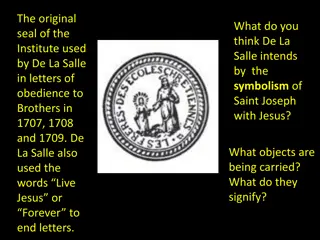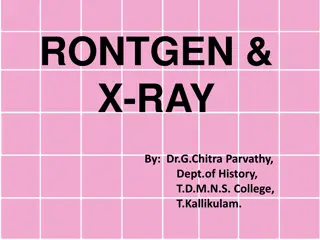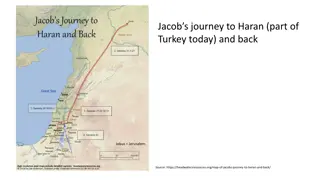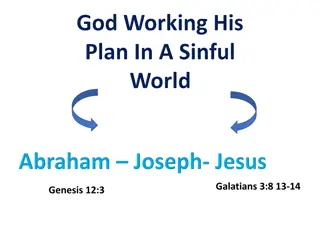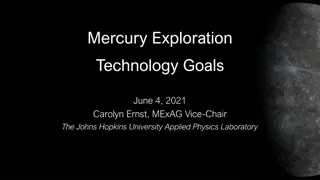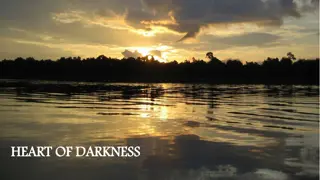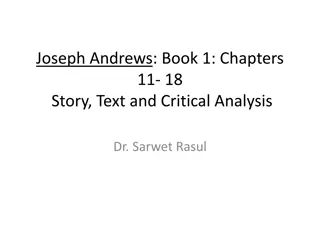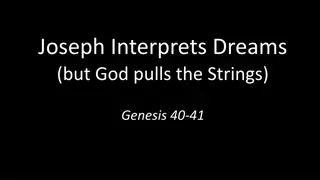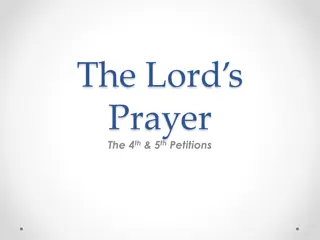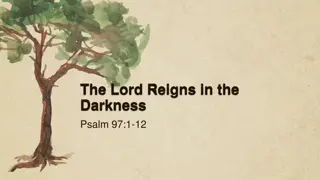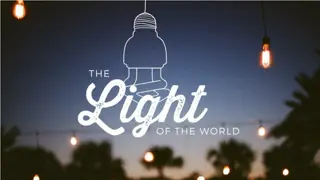Joseph Conrad: A Brief Biography and Exploration of Themes in "Heart of Darkness
Joseph Conrad, a Polish-British writer, led a fascinating life as a merchant mariner before becoming a renowned author. His notable works include "Heart of Darkness," a novel exploring the complexities of imperialism and the human condition. Through Conrad's experiences and writings, profound ideas on morality, colonialism, and the darkness within humanity emerge, shaping his legacy in literature.
Download Presentation

Please find below an Image/Link to download the presentation.
The content on the website is provided AS IS for your information and personal use only. It may not be sold, licensed, or shared on other websites without obtaining consent from the author.If you encounter any issues during the download, it is possible that the publisher has removed the file from their server.
You are allowed to download the files provided on this website for personal or commercial use, subject to the condition that they are used lawfully. All files are the property of their respective owners.
The content on the website is provided AS IS for your information and personal use only. It may not be sold, licensed, or shared on other websites without obtaining consent from the author.
E N D
Presentation Transcript
Heart of Darkness 1899 JOSEPH CONRAD
Conrad and the Modern World Born J zef Teodor Konrad Korzeniowski on December 3, 1857, in Berdichev (now Berdychiv), Ukraine. Aged 4, exiled with his Polish parents by Russian authorities. Brought up by his uncle after his parent s death. At the age of 16, Conrad left Poland for Marseilles, where he began his career as a merchant mariner on ships to South America & the Caribbean islands. Joined British Merchant Marine fleet which he served for 16 years, sailing to South-East Asia, Africa, Australia. He also became a British citizen. Married to Jessie Emmeline George in 1896, and begins to move in British literary circles with writers such as H.G.Wells and Ford Maddox Ford. Almeyer s Folly (1895), Lord Jim (1900), Heart of Darkness (1902), Nostromo (1904), The Secret Agent (1907) Short stories and autobiography dominated the final decades of his life. Final novel, The Rover, published in 1923 - one year before his death from heart attack on August 3 1924.
The Congo: It is an extraordinary thing that the conscience of Europe which seventy years ago put down the slave trade on humanitarian grounds tolerates the Congo State to-day. It is as if the moral clock had been put back many hours. And yet nowadays if I were to overwork my horse so as to destroy its happiness or physical well-being I should be hauled before a magistrate. It seems to me that the black man -- say, of Upoto -- is deserving of as much humanitarian regard as any animal since he has nerves, feels pain, can be made physically miserable. But as a matter of fact his happiness and misery are much more complex than the misery or happiness of animals and deserving of greater regard. He shares with us the consciousness of the universe in which we live -- no small burden." (Joseph Conrad, Letter to Roger Casement, December 21, 1903) "An official Belgian government commission in 1919 estimated that from the time Stanley began laying the foundation of Leopold s state, the population of the territory had been reduced by half . (Adam Hochschild, King Leopold s Ghost)
Conrad in Congo Thursday, 3rdJuly. Left at 6 a.m. after a good night s rest. Crossed a low range of hills and entered a broad valley, or rather plain, with a break in the middle. Met an officer of the State inspecting. A few minutes afterwards saw at a camping place the dead body of a Backongo. Shot? Horrid smell. (Joseph Conrad, Congo Diary)
Congo and the Problem of Style It seems to me that I am trying to tell you a dream making a vain attempt, because no relation of a dream can convey the dream sensation, that commingling of absurdity, surprise, and bewilderment in a tremor of struggling revolt, that notion of being captured by the incredible which is of the very essence of dreams." (Heart of Darkness) " .to him the meaning of the episode was not inside like a kernel but outside, enveloping the tale which brought it out only as a glow brings out a haze, in the likeness of one of those misty halos that sometimes are made visible by the spectral illumination of moonshine" (Heart of Darkness).
Heart of Darkness projects the image of Africa as "the other world," the antithesis of Europe and therefore of civilization, a place where man's vaunted intelligence and refinement are finally mocked by triumphant bestiality. (Chinua Achebe, An Image of Africa: Racism in Conrad s Heart of Darkness. Massachusetts Review 18 (1977) The eagle-eyed English critic F. R. Leavis drew attention long ago to Conrad's "adjectival insistence upon inexpressible and incomprehensible mystery." That insistence must not be dismissed lightly, as many Conrad critics have tended to do, as a mere stylistic flaw; for it raises serious questions of artistic good faith. When a writer while pretending to record scenes, incidents and their impact is in reality engaged in inducing hypnotic stupor in his readers through a bombardment of emotive words and other forms of trickery much more has to be at stake than stylistic felicity. (Ibid.)
Wilson Harris: Achebe s essay on the dehumanization of Africa and Africans by bloody racists is, therefore, in the light of Western malaise, and post-imperial hangover, a persuasive argument but I am convinced his judgement or dismissal of Heart of Darkness and of Conrad s strange genius is a profoundly mistaken one. He sees the distortions of imagery and therefore character in the novel as witnessing to horrendous prejudice on Conrad s part in his vision of Africa and Africans. As I weighed this charge in my own mind I began to sense a certain incomprehension in Achebe s analysis of the pressures of form which engaged Conrad s imagination to transform biases grounded in homogenous premises. ( The Frontier on which Heart of Darkness Stands in Explorations, p. 134).
Form as Content The rhetorical extravagances of Marlow s narrative performance opening up a chasm between words intended to communicate an extraordinary experience to identified auditors already acquainted with, and implicated in Europe s overseas adventures, and words connoting that which Marlow cannot properly articulate." (Benita Parry, The Moment and Afterlife of Heart of Darkness )
Dying to Work They were dying slowly it was very clear. They were not enemies, they were not criminals, they were nothing earthly now, - nothing but black shadows of disease and starvation, lying confusedly in the greenish gloom ." (Heart of Darkness)
The right kind of work It was an extraordinary find. Its title was, An Inquiry Into Some Points of Seamanship [ .] Not a very enthralling book; but at the first glance you could see there a singleness of intention, an honest concern for the right way of going to work. What redeems it is the idea only. An idea at the back of it; not a sentimental pretence but an idea; and an unselfish belief in the idea something you can set up, and bow down before, and offer a sacrifice to (Heart of Darkness)
Shapes of Things to Come "For all his bluster about the natives and their primitivism, in the scenes in which Marlow actually encounters the native Congolese at work when he encounters them as workers we find a subtly rendered sense that their working situation differs from Marlow s not so much in its nature as in its intensity. The native Africans [ .] appear not so much as avatars of a prehistorical past than a post- historical future. (Michael Sayeau, Work, Unemployment, and the Exhaustion of Fiction in Heart of Darkness , NOVEL, 39.3 (2006), 337-360)
I missed my late helmsman awfullyI missed him even while his body was still lying in the pilot-house. Perhaps you will think it passing strange this regret for a savage who was no more account than a grain of sand in a black Sahara. Well, don t you see, he had done something, he had steered; for months I had him at my back a help an instrument. It was a kind of partnership. He steered for me I had to look after him, I worried about his deficiencies, and thus a subtle bond had been created, of which I only became aware when it was suddenly broken. And the intimate profundity of that look he gave me when he received his hurt remains to this day in my memory like a claim of distant kinship affirmed in a supreme moment. (Conrad)
Time Travel "Going up that river was like travelling back to the earliest beginnings of the world, when vegetation rioted on the earth and the big trees were kings . There were moments when one s own past came back to one, as it will sometimes when you have not one moment to spare to yourself; but it came in the shape of an unrestful and noisy dream." (Heart of Darkness)
Futures Perfect But I couldn t. I could not tell her. It would have been too dark too dark altogether Marlow ceased, and sat apart, indistinct and silent, in the pose of a meditating Buddha the tranquil waterway leading to the uttermost ends of the earth flowed somber under an overcast sky seemed to lead into the heart of an immense darkness. (Heart of Darkness)
